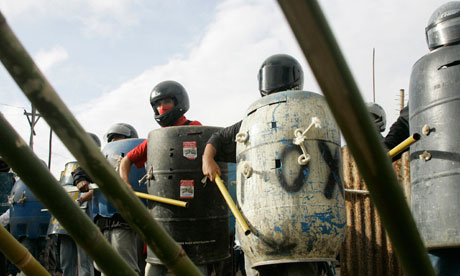Originally posted by the Guardian at https://apps.facebook.com/theguardian/commentisfree/cifamerica/2012/jan/24/brazil-pinheirinho-eviction-inspiration?fb_source=other_multiline&fb_action_types=news.reads
 Pinheirinho squatters wearing improvised armour stand ready to resist the police. Photograph: Reuters
Pinheirinho squatters wearing improvised armour stand ready to resist the police. Photograph: Reuters
The photograph spread around the world fast: it shows residents of the Pinheirinho favela in the state of São Paulo, donning helmets, shields and building barricades to resist an eviction order. Such events are not unusual in Brazil, though this one has attracted international attention.
Pinheirinho has been squatted for eight years, with no government effort to regularise the area or develop an adequate infrastructure. Home to roughly 6,000 people, the land belongs to a notorious financial market fraudster arrested in 2008. Spurred by Brazil's property development boom, the local administration has recently become active in pursuing the eviction, aided and abetted by judges who seemed to wish to make that happen as quickly as possible.
After that first picture publicised the evictions, the federal government promised to intervene by buying up the land and developing it for the squatters. On those grounds, a federal judge halted the eviction, only to be quickly overruled by another one, who declared it a state matter. The state judiciary then acted fast before the favelados' lawyers could react.
On Sunday, social networks were buzzing with reports of war-like scenes and tales of brutality, including a media ban and mobile phone block in the area and the rumoured detention of a federal representative and a senator who attempted to intervene (they later clarified they were not detained, but trying to negotiate). As many as seven deaths have been reported, including a baby, though none officially confirmed yet.
It was mostly thanks to social media that information about the evictions could be found. On Twitter, the #Pinheirinho hashtag became a top trending topic for a couple of hours. Throughout the day, Brazil's corporate media, which has historical ties to the party in power at both state and local level, reported the story in muted tones: headlines highlighted a TV van set on fire while paying less attention to people's houses in flames.
In places like Iran and Egypt, social media has functioned as a tool against state control of information. In Brazil, it has helped bypass a monolithic private media sector, which is under-regulated and highly concentrated (90% of the industry is in the hands of 15 families). As other means of producing and circulating information became more readily available and a so-called "progressive blogosphere" developed, the country's corporate media, which gave space for the most aggressive opposition to the Lula and Rousseff administrations, began to lose credibility. The alternative outlets were vociferous in their condemnation of the São Paulo state government last Sunday, and rightly so. But elsewhere on the political left there are hints of double standards.
The larger picture behind the Pinheirinho story is Brazil's economic boom, in which construction and property are playing a growing role. This process was accelerated by Brazil being chosen as host of the 2014 World Cup and 2016 Olympics. A dossier produced by the National Co-ordination of World Cup Committees estimates that some 170,000 people around the country will be evicted owing to the sporting events (official numbers have never been announced). This ultimately means the state handing public areas – and those occupied by the poor – over to private developers while taxpayers bankroll the whole process. Perhaps the worst case so far has been in Rio, where evictions have been as authoritarian and unilateral as that of Pinheirinho, if not as spectacularly militarised. By comparison, voices on the left have been much slower in denouncing this.
The gargantuan developmentalism that characterises the left-leaning Rousseff government, with its emphasis on economic growth and quantitative indicators rather than participation, environmental protection and wealth redistribution, finds itself in a political impasse. This gigantism brings the government, even as it mobilises old anti-imperialist tropes, closer to big mining, agribusiness and construction interests and further from old allies like Brazil's landless workers movement.
Many on the left have found it hard to articulate a critique of those processes when they are not carried out by the political right. There are stirrings that suggest this may be changing, such as recent campaigns against Petrobrás (state oil company), Vale do Rio Doce (mining) and the building of the Belo Monte hydroelectric plant. They are small signs, so far still somewhat isolated, but it might be the start of something. If so, Pinheirinho could prove itself to be a lesson, an indictment and an inspiration.
No comments:
Post a Comment